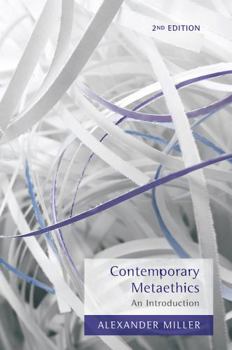Contemporary Metaethics: An Introduction
Select Format
Select Condition 
Book Overview
This new edition of Alexander Miller's highly readable introduction to contemporary metaethics provides a critical overview of the main arguments and themes in twentieth- and twenty-first-century contemporary metaethics. Miller traces the development of contemporary debates in metaethics from their beginnings in the work of G. E. Moore up to the most recent arguments between naturalism and non-naturalism, cognitivism and non-cognitivism. From Moore's...
Format:Paperback
Language:English
ISBN:074564659X
ISBN13:9780745646596
Release Date:April 2013
Publisher:Polity Press
Length:320 Pages
Weight:1.10 lbs.
Dimensions:1.0" x 6.1" x 9.1"
Customer Reviews
1 rating
A Helpful Guide to Contemporary Positions in Meta-Ethics
Published by Thriftbooks.com User , 20 years ago
Miller has written a good book that covers a lot of the territory in contemporary meta-ethics. The book is structured around two basic debates within the field: the debate between cognitivists and noncognitivists, and the debate between realists and anti-realists.The presentation of the material reflects the canned history of twentieth-century meta-ethics that should be familiar to anyone with some knowledge of the area. Our story begins with G. E. Moore's Principia Ethica, which is the subject of the second chapter of Miller's book. Moore's Principia (along with the work of Prichard, Ross, et al.) involves a defense of a particularly puzzling and problematic form of moral realism, namely non-naturalist intuitionism, and includes his famous Open Question Argument, which is the focus of Miller's chapter. The second part of our story, and the remainder of Miller's book, begins with a backlash against Moore. Moore's non-naturalist intuitionism included the following views: that central components of moral language are indefinable, that moral facts can only be known as self-evident intuitions, and that moral properties are sui generis and not reducible to natural properties. A rejection of views of this sort gave rise to various forms of noncognitivism found in Ayer (who is Miller's representative of early noncognitivism), Stevenson, Hare, et al. that dominated English-language meta-ethics in the middle of the twentieth century. These philosophers rejected Moore's non-naturalist metaphysics and intuitionist epistemology as inconsistent with a naturalistic conception of the world. They also rejected moral realism because they thought Moore's OQA, or something similar to it, showed that realism was committed to defending those doctrines of Moore's that they found untenable (and perhaps incredible). The route out of the metaphysical and epistemological problems relating to morality, they thought, was to be found in a distinctive account of the nature of moral language. In particular, they argued that moral language is used to express our emotions and attitudes, or to prescribe certain actions for ourselves and others. However, the noncognitivists ended up running into all sorts of problems in accounting for our ordinary beliefs about ways in which moral language can be used, the possibility of moral knowledge, the existence of correct answers to more questions, and the objectivity of morality. In Miller's book, we see contemporary thinkers like Simon Blackburn and Allan Gibbard, who defend forms of noncognitivism, wrestling with these problems. Still, their answers don't satisfy everyone, and some thinkers returned to a form of cognitivism: that is, they began to defend the position that ethical language purports to describe a realm of moral facts. And this brings us to the third part of our history of contemporary meta-ethics and of Miller's book: the backlash against (at least the earlier, cruder forms of) noncognitivism. All these






